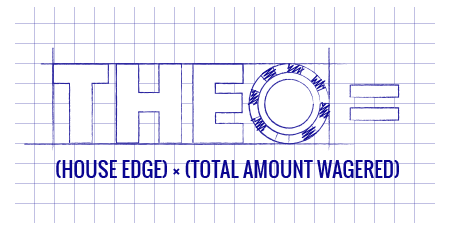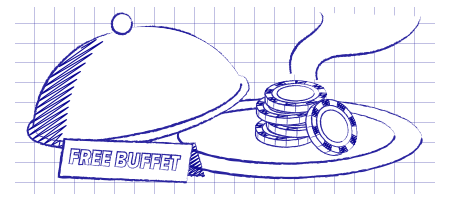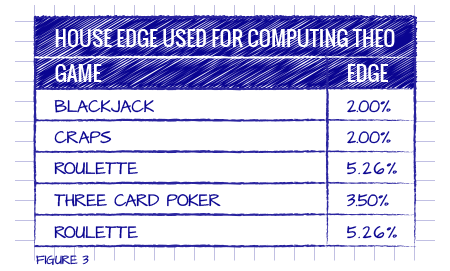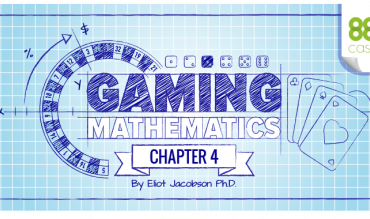
Of all the numbers that describe a casino player, the one that is most often sought out by marketing is the theoretical win (theo). This number describes the expected house win for a player, based on the total amount wagered by the player and the game played. To compute the theo, only two numbers are needed: the house edge of the game and the total amount wagered. There may be technical problems with getting accurate values for these numbers, but at its core, the formula for theo is simple:
The theoretical win for players who play Casino War is (0.0290) × (total amount wagered). The theoretical win from players who place a wager on the pass line in craps is (0.0141) × (total amount wagered). As a specific example, if players wager $1 per spin on roulette, for one million spins, the house expects to earn about 0.0526 × $1,000,000 = $52,600. Some players will win big in a session, other will lose big. Some will have mediocre results up or down. Whatever happens in practice, the theoretical win for the casino can always be computed using the house edge and total amount wagered.

A player’s theo is the fundamental number that is used as a basis for assessing the worth of the player. This number has nothing to do with the actual win or loss of the player in a session or over a period of time. Promotions, comps, hosting and other reinvestment strategies are often based primarily on a player’s theo measured over some period of time. Theo is based on the history of a player’s action and is used, along with demographic and metrical information, as a forecast of future action. It is the key dollar value that drives reinvestment in the player.
 For example, if a player plays roulette for 4 hours, at $20 per spin, and there are 30 spins per hour, then the player has wagered a total of 4 × $20 × 30 = $2,400. Regardless of what actually happened at the table with the player, the casino uses the house edge to compute the player’s theo. In this case, the player’s theo is $2,400 × 0.0526 = $126.24. If the casino is reinvesting at a rate of 20% of theo, then the casino has 20% x $126.24 = $25.24 set aside to reinvest in the player. The hypothetical roulette player above may be given a free buffet lunch. Management knows that in theory the casino has won a lot more than the cost of a lunch from this player, even if the player won $1,000 in the session.
For example, if a player plays roulette for 4 hours, at $20 per spin, and there are 30 spins per hour, then the player has wagered a total of 4 × $20 × 30 = $2,400. Regardless of what actually happened at the table with the player, the casino uses the house edge to compute the player’s theo. In this case, the player’s theo is $2,400 × 0.0526 = $126.24. If the casino is reinvesting at a rate of 20% of theo, then the casino has 20% x $126.24 = $25.24 set aside to reinvest in the player. The hypothetical roulette player above may be given a free buffet lunch. Management knows that in theory the casino has won a lot more than the cost of a lunch from this player, even if the player won $1,000 in the session.
 For slot machines and keno, a player’s theo can be precisely determined. For those games that require strategic decisions, like blackjack or video poker, a player will rarely play well enough to get the theoretically optimal house edge. In craps, the pass line wager has a house edge of 1.41%. However, most players will make additional bets (like “place” or “buy” or “proposition” wagers) that have a higher house edge. In combination, most players play craps giving up a house edge in excess of 2%. For this reason, there is a bit of “art” to computing the practical house edge for many live casino table games as well as video poker. Without an exact value for the house edge, it is impossible to correctly compute a player’s theo. Figure 3 gives values that are used by some casinos for the house edge for popular table games.
For slot machines and keno, a player’s theo can be precisely determined. For those games that require strategic decisions, like blackjack or video poker, a player will rarely play well enough to get the theoretically optimal house edge. In craps, the pass line wager has a house edge of 1.41%. However, most players will make additional bets (like “place” or “buy” or “proposition” wagers) that have a higher house edge. In combination, most players play craps giving up a house edge in excess of 2%. For this reason, there is a bit of “art” to computing the practical house edge for many live casino table games as well as video poker. Without an exact value for the house edge, it is impossible to correctly compute a player’s theo. Figure 3 gives values that are used by some casinos for the house edge for popular table games.
If the casino uses values for the house edge for table games that are too high, then marketing will get a value of a player’s theo that may be larger than it actually is. This may lead to overinvestment in a player and in some cases the casino can become upside down to the player. Over-investment gives players a sense of entitlement. It is very difficult to repair a marketing program that has over-invested in players for an extended period. Loyal players may wonder why they suddenly are worthless, causing animosity and possibly leading to defection.
If the casino uses values for the house edge for table games that are too low, then marketing will underestimate a player’s theo. This may lead to under-investment in a player. Players who are underrated will feel like the casino is cheap and may go in search of a casino that treats them better.



